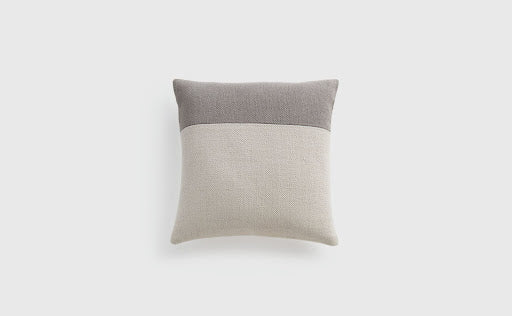There’s no one-size-fits-all formula for a restful night, but there are steps everyone can take to ensure riding the rainbow to dreamland is a pleasant experience. Choosing the right bed pillow is one of the most important steps.
The question is: what type of pillow will you choose?
Memory foam, a malleable synthetic material primarily composed of polyurethane, is a popular option thanks to its many sleep-enhancing benefits. It may not have the luxurious softness of down, but the dense foam has plenty going for it. But are memory foam pillows good?
Read on to learn about six memory foam pillow benefits that stack up higher than the last pillow fort you made.
Made for comfort, durability, and support, the Casper foam pillow provides a host of benefits you’ll love to come back to every night when you sleep.
#1 The Support You Need and Deserve
There’s no doubt about it: the primary draw of memory foam pillows is their supreme support.
By reforming and conforming to the shape of your head and neck, the layers promote proper spinal alignment.1 That means these pillows:
- Are perfect for side sleepers and back sleepers
- Put less strain on your upper body muscles
- Make it far easier to find a comfortable sleeping position
- Promote more refreshing deep sleep
The Casper Foam Pillow was dreamed up with three layers of supportive foam. When you lie down for bed at night, that dream becomes a reality thanks to its pressure relief. Uncomfortable pressure points become a thing of the past as the firm yet flexible foam distributes itself according to your weight, preventing you from experiencing stiff neck, shoulder pain, and any other upper body cramping.

#2 Durable and Huggable
As wonderful as soft, fluffy a regular pillow can be, one of the main drawbacks is their tendency to clump up over time. After all, natural materials like a down pillow, bamboo pillow, and feather pillow don’t last forever.
Memory foam doesn’t have that problem.
Indeed, it’s far less liable to become lumpy thanks to its synthetic nature unlike the traditional pillow. A Casper Foam Pillow should stay firm, smooth, and plushly huggable for the majority of its lifespan, all thanks to the combination of low- and high-density foams within. That lifespan can be up to three years if the proper care is taken.2
#3 Cooling Comfort
There’s not a person on Earth who hasn’t flipped their pillows over to “the cold side” at least once in their life. For most people, it’s a lot more than once.
Casper Foam Pillows circumvent that irritating process by staying cool all night long with AirScape™ technology. Simply put, hundreds of tiny perforations in the dense foam cause air to flow up and out of the pillow. Trapped air becomes warm given time, so by releasing it, the pillows lower the risk of sleeping hot overnight.
#4 Hypoallergenic Heaven for Your Head
It’s an unfortunate truth that all pillows are prone to pesky parasites such as the following:
- Mold
- Bacteria
- Dust mites
Dust mites can be particularly difficult to deal with and are true nightmares for people with dust allergies. With symptoms that run from sneezing to shortness of breath, people understandably do everything they can to avoid such allergens.3
Luckily, memory foam’s synthetic nature isn’t conducive to those same allergens’ proliferation, making it hypoallergenic.4 So long as you keep your pillow clean, sleepers with allergies and sensitive skin can rest easy, knowing your symptoms won’t be triggered every time you lie down.

#5 Safe Materials
Some synthetics don’t have the greatest history when it comes to health and the environment, but every Casper Foam Pillow contains CertiPUR-US-certified materials.5 That means the polyurethane and viscoelastic foam used is free of:
- Flame retardants
- Heavy metals
- Phthalates (dangerous softening agents)
- Ozone depleters
- Formaldehyde
In addition, the pillows’ low VOC emissions won’t compromise your indoor air quality.
#6 A Variety of Choice
Assuming you’ve chosen a memory foam pillow over the alternatives, you now have a second choice to make between the various subtypes of memory foam pillows. Here are three prominent ones:6
- A shredded memory foam pillow is exactly what it sounds like. The filling consists of myriad individual pieces of foam. It’s quite breathable and is also easy to mold.
- True to its name, a wedge memory foam pillow forgoes the traditional rectangular shape for a triangular one. The slant makes it a great option for leaning against (perfect for reading a book before bed) or for propping up your legs.
- The valley-like cut of a contour memory foam pillow is tailor-made for resting your head in. It takes the neck and back support of its foamy kin up a notch.
Good Sleep Is Shaped by Casper Foam Pillows
Between the unparalleled support it provides and its hypoallergenic materials, the Casper Foam Pillow is ideal for health-conscious sleepers. If you love your memory foam mattress, pair it with the perfect pillow.
Now that you’re aware of the benefits, you can decide if this pillow is right for you. We’re happy to field any more sleep-related questions you might have!
Sources:
- Island Slumber. Top 5 Health Benefits Provided by Sleeping on Memory Foam Pillows. https://www.islandslumber.com/blogs/news/top-5-health-benefits-provided-by-sleeping-on-memory-foam-pillows
- Fancy Sleep. How Long Do Memory Foam Pillows Last? http://fancysleep.com/how-long-do-memory-foam-pillows-last/
- American College of Allergy, Asthma, and Immunology. Dust Allergies. https://acaai.org/allergies/allergic-conditions/dust-allergies/
- Sleep Junkie. Are Memory Foam Pillows Good for Allergies? https://www.sleepjunkie.com/dust-mites-fungus-bacteria-oh-my-latex-and-memory-foam-pillows-may-help-your-health/
- CertiPUR-US. About Certified Foam. https://certipur.us/about-the-seal/
- Counting Sheep. Memory Foam Pillow and its Amazing Benefits. https://www.countingsheep.net/memory-foam-pillow-benefits/











